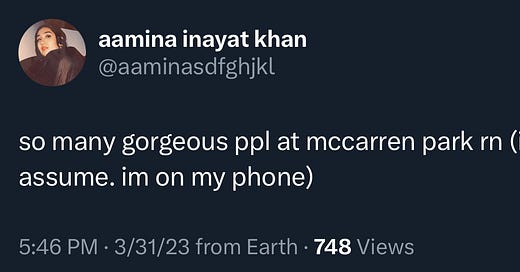I wrote the first version of this essay when some dramatic thing was happening with Twitter, but a lot of dramatic things happened with that place, and I can’t remember the exact details to be honest. It started as a series of incoherent notes, though I’m not sure it’s much farther in its current state. Anyway.
When I first joined the Internet, it was back when we didn’t really know what it was. I was a child, obviously. It was pre-Tumblr, and definitely pre-Facebook. The first accounts I was making were on pop music forums and social media websites that I don’t even remember the names of because they never reached any sort of prolific level of notoriety. In my earliest years online, I spent my summer vacations in elementary and middle school on my family computer downloading leaked Disney pop albums and arguing with fans over whether I was a good or bad person for downloading those leaked albums. Then I got old enough to know what it was really good for: being psychotic and perverted and mean and gay, but anonymously. It was like studying abroad, but it was free and you could be in high school, or even better, middle school.
There was actually a sense of foreignness to the Internet. Online shopping hadn’t caught on (my first online purchase, the Hannah Montana season 1 soundtrack, was made by kicking and screaming and promising my parents it wasn’t a scam). Streaming movies and TV was still semi-fringe (target demo for the hot singles in my area). The news channels were running near daily segments about the Internet with a churchy sense of hysteria. Parents were nervous (they were right though). And people at school, the normal ones, rarely extended their curiosity past instant messaging. Around this time, MTV would air specials like True Life: I Live Another Life on the Web about people obsessed with the Internet. Real life was the status quo, where respectable people led their respectable lives and pursued professional and academic gain, found love and started families — and the Internet was the strange back alley full of punks and outcasts.
It was a lawless land. And not that it was without flaws (duh), but that was the magic of that era. It was simple and terrible and beautiful, like cowboy movies. The young people who were too weird to find community in real life found it in this new age thing they’d never be able to explain to their parents. It gave people language to describe their weird shit without having to live in places like New York and Berlin (though all of those people eventually moved to New York and Berlin). A pop music renaissance was happening too. Tumblr 2012-2015 was Woodstock. Charli XCX, Lorde, the 1975 were coming onto a scene that was born entirely online — even knowing their names was a dead giveaway that you probably knew basic HTML and the Manic Panic color names. I do get why today’s teenagers romanticize being a pop music fan during the early 2010’s. I would too. Not to be corny, but you could be seen without ever really being witnessed. They have no idea what that’s like. For those few years, the Internet was an open door, and you’d never stumble in and fall down the rabbit hole unless you were mad.
But that’s not true anymore. There’s virtually no part of the Internet that’s subversive, while also being available to anyone who needs it. So quickly, the world learned the Internet’s power, specifically its money-making power, and exploited it. The new American dream is being popular online — we’ve been tricked into thinking being an influencer means you don’t have to work a job, but that is actually a very standard marketing job in sheep’s clothing. As Twitter’s empire has been allegedly crumbling, there’s been swift talk of what’s next. Everyone is running to the streets, screaming, ‘Somebody, anybody, even fucking Mark Zuckerberg, do something to keep the party from dying down.’ I’m only sorry I didn’t see it coming, but in my defense, I was a child.
What this conversation completely misses is that there is no next, not in this form anyway. The Internet makes a lot of money, and it will probably continue to. Opening your social media apps is the new waking up on a Monday, kissing your wife on the lips, and going to work. But when we open accounts on new platforms and wonder whether or not this will spark a sense of home, it won’t. There is no sense of discovery, no sense of newness, no sense of refuge from a status quo. It is the status quo. It is the cool kids in high school who actually kind of sound boring because they have no choice but to sound like everyone else. There are a few funny jokes here and there, and a hoard of people ready to copy them. It is conformity, and it is paranoia that you’ll get left behind if you don’t like conformity. There is no innovation, there is only dollars. There is no subculture, there are only tutorials of their aesthetics. People talk about scrolling like they used to talk about their hometowns, desperately wanting to escape, while still wanting to appease the arbiters of coolness. The Internet was cool like shopping malls, and we know what happened to shopping malls.
I don’t even have a real conclusion. Honestly. I’m just kind of relieved that real life is back. (And if anyone tells me to touch grass, the only people who say “touch grass” are Internet addicts. Get it together. You’re just like me.)





Wonderfully put. I particularly enjoy the comment on those "touch grass" people. It is good to be in real life again.